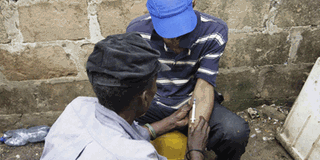Prime
Drug trafficking problem growing silently in Uganda

Ugandans are becoming increasingly involved in a dangerous world of drug use and trafficking.
What you need to know:
Though police say only a small number of Ugandans abuse drugs, the bigger question is how an interconnected web of drug trafficking, growing, selling, using and recruiting has been able to take advantage of the country’s system – and how it can be stopped before it is too late.
As far as sensational stories go, the Amazing Race producer Jeff Rice incident is already interred in the grave of stories that once made headlines.
The story broke through international media, and focused on the scandal of the death of the high-profile American producer. After first suggesting that thieves had poisoned the producer and his assistant after failing to rob them, the truth emerged – that the incident was in fact the result of a bad cocaine deal gone wrong.
The scandal posed a number of questions that remain unanswered.
One might wonder how accessing high-end narcotic drugs has become as easy as dialling the number of a special hire driver, for instance. As police say only a small number of Ugandans are abusing drugs, for now the bigger question is how an interconnected web of trafficking, growing, selling, using and recruiting has been able to take advantage of the country’s system – and how it can be stopped before it is too late.
Uganda’s loopholes
The anti-narcotics department says between 2009 through 2011, there were 30 cases of hard drug seizures reported at Entebbe airport. There were 220 kg of heroin, cocaine, methamphetamine and pharmaceutical drugs seized in the same time frame.
It may not seem like a lot, but according to United Nations Office on Drugs and Crime, (UNODC) seizures at East African airports are not at all reflective of the actual amounts that enter a country, nor do they reflect the true extent of trafficking patterns. There are likely hundreds of kilos that go through the borders unnoticed in the absence of detectors or thorough checking. UNODC’s drug trafficking patterns since the 2006 report says the region is attractive to international drug trafficking syndicates for its lax border controls, limited regional cooperation and overwhelmed justice systems.
“The low seizure figures are more an indication that few resources are allocated to drug control and that international border controls are weak, than a sign that no drugs are being trafficked through the region,” the report says.
Fabian Ahmadiya, the Commissioner of Uganda’s anti-narcotics department, agrees. “I have seen it myself. There is no serious checking really,” he says.
Mr Ahmadiya displays a small assortment of confiscated goods. One is an ordinary looking jewellery box from South America that was seized at the General Post Office. Under the velvet lining where the imitation gold rests is a Formica lined partition, each holding about half a kilo or about $10,000 worth of cocaine.
And the latest Entebbe seizure of cocaine this month was just a few grams shy of a kilo, was found in the stomach of a suspect.
Ahmadiya says a lot of these types of methods are most commonly used to bypass various border points; Uganda has become a transit point for drugs.
Uganda, the unwitting middleman?
Ugandan authorities have known for a while now that there have been narcotics coming into the country on their way to larger markets abroad.
The region has become an all-important transit point for drugs on their way from the main distribution hub on the continent, the West African coast, where they are repacked and distributed, to the main markets in Europe and Asia.
“China is a hot place right now, they (the dealers) must have realised the price is quite good or there is high demand because of the high population,” Mr Ahmadiya says.
Much as the activity is mainly transit, he adds, the gradual rise in “spill over drugs” has begun to take its toll.
“This spill over is creating a problem. More and more people are getting addicted because the drugs are more available. If you go to Nakulabye, Muzaana, Kisenyi and Makerere Kivulu, you will get heroin locally called omuggo. Even crude cocaine.”
Traffic turns into usage
At the popular party belts – Kabalagala, Kisementi and Wandegeya – the use and purchase of drugs typically goes on in the late hours of the night. As other revellers drink or dance away, the money changes hands covertly as the music plays.
Robert Ojaba, the head of training and drug resistance education at the anti-narcotics department, says activity in areas such as these shows the country is slowly transforming from a transit hub to a hub of consumers. It was always inevitable; all that goes in does not necessarily come out.
Some narcotics make it to the open market through a network of local small time dealers who in turn make it available to the consumers in more pocket-friendly packages. It is here that they are most often tampered with, to reduce the quality and cost to the drug dealer’s benefit.
“This American was given adulterated cocaine so we cannot say it is not around in small pockets of consumers and dealers here and there,” Mr Ahmadiya says in reference to the Jeff Rice case.
There were 14 convicted drug cases in 2011 but Mr Ojaba says these only reflect what police have been able to seize if they act quickly enough on intelligence and tip offs. The ideal is to arrest a drug dealer, make him sing and then reel in the supply chain all the way to the top. But the reality is its no easy task and Uganda’s system is not equipped to infiltrate a highly organised narcotics network. With the police anti-narcotics department having only about 85 fully trained personnel and two sniffer dogs at Entebbe, keeping ahead of the drugs (and the long arm of drug money) can be tough.
“With organised crime, it is hard to get to the root. You can very easily arrest a person who turns out to be a courier, and genuinely has no idea who the main supplier is,” says Mr Ojaba. “You find someone saying they got their drugs from ‘Rock’ or ‘Ram’ – it ends up being a wild goose chase.”
Ugandan drug mules
The small fish lured by the promise of money beyond their wildest dreams are prime candidates for not asking any questions. Blame the high rate of recruitment into the drug trade on unemployment or greed if you may, that doesn’t change the fact that more young Ugandans are hardly informed about the real dangers are getting drawn into an intercontinental drug trafficking web.
“Ugandans feature as couriers,” says Mr Ahmadiya, “some of those arrested in China were just fresh graduates or students hoping to make tuition quickly,” he says, adding that even more women are getting involved by the day.
Many are recruited and are taken advantage of because of poverty and the lure of easy money. Mr Ojaba says some make as much as $5,000(about Shs12m) for one delivery, not to mention that the dealers cover all their costs.
“I blame it on unemployment really, these young people are easily lured by the promises of better life,” he said.
Yet arrests in some foreign countries may be followed by death sentences, hefty fines or life imprisonment, which many couriers only come to learn about down the road, and it is often too late.
“We have several Ugandans serving long drug-related sentences right next door in Kenya and about 71 we know of who are convicted in China – all deaths sentences and life imprisonment,” says Mr Ahmadiya.
Legal limitations
In comparison, Uganda’s laws are laughable. The maximum conviction under the National Drug Authority (NDA) law of three years in prison and a fine of no more than Shs2m which makes it by far the weakest within the region. Kenya has a life maximum sentence of life for traffickers and fines of up to three times the value of the drugs if one is caught. Traffickers in Rwanda face life imprisonment, while those in Tanzania get nothing less than lengthy sentences and hefty fines.
According to Mr Ojaba, the law renders police efforts almost futile as the lenient sentence and fine does not come close to deterring traffickers.
“Often those we nab will insist on being taken to court almost immediately, plead guilty and pay the fine. For someone trafficking drugs worth tens or hundreds of millions, a two million (fine) is nothing,” he said.
Mr Ojaba says Uganda needs to pass its Anti-Narcotic and Psychotropic Substances Bill, which has been languishing in parliament since 2007. The bill would provide for investigation of suspected drug dealers and serve stiffer sentences (up to life for trafficking), deterring those who might right now be unfazed by the weak current penalties.
With the Anti-Narcotics Psychotropic Substances and Anti-Money Laundering Bills enacted, he maintains that it would be much easier to track traffickers down and identify the weaknesses “at the root”.
He explains that, for example, the department will be able to investigate money-laundering scams, which are usually tied to drug dealing, which would then lead them to the source.
“The big fish, mainly foreigners from Pakistan (the origin of most heroin) and West Africa pose as investors and use the businesses as fronts,” Mr Ojaba says.
The bill has been reintroduced once again and is under review in the current parliamentary session.
What you need to know
Tough punishments await drug traffickers in foreign lands
In China, for example, which has been listed as a hot market, the sentence for trafficking is no less than life or death sentence.
In Indonesia, one can get as many as twenty years for cannabis possession. Nigeria is notorious for being Africa’s narcotics hub, but adopted tougher sentences since forming the National Drug Law Enforcement Agency in 1990.
Uganda’s drug of choice
According to commissioner, cannabis is the drug of choice for most Ugandans, mainly urban poor youth. It is overwhelmingly Uganda’s most popular drug though not a narcotic, and on its own would raise the amount of drugs seized last year into the thousands of kilos.
“You find it in every township in the country because It is produced here, mainly grown in the districts of Busia, Luwero, Mpigi and Namayingo,”says Ahmadiya. That cannabis has a large market all over the region doesn’t help matters with most growers depending on it as a source of income despite knowing it is illegal. It is seen as a profitable crop, which is why people grow acres and acres of it.” Mr Ahmadiya says. “Most of that Njaga (local name for marijuana) grown in Busia has a huge market in Kenya,” he adds.
The law
The Permanent Secretary of Internal Affairs under whose docket the pending Anti Narcotic and Psychotropic Substances Bill falls insists Uganda is not a weak link, but concedes that the bill’s passing is crucial to ensuring it does not become one.




